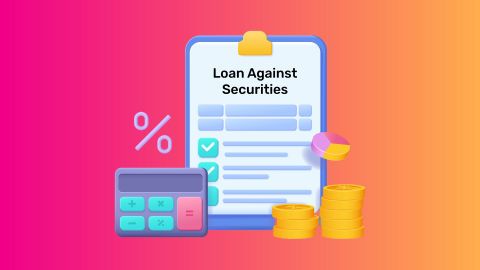Full form of LAS and meaning
The full form of LAS in banking is Loan Against Securities. It’s a facility that allows you to pledge financial instruments like shares or mutual funds as collateral. The lender gives you a loan based on the value of these assets. If you are unable to repay, the lender has the right to sell the pledged securities to recover the dues.
What makes LAS so useful is that you can retain ownership of your assets while borrowing against them. It is a flexible option for investors looking for liquidity without disinvestment.
Types of securities eligible for LAS
Not all securities qualify for LAS, but here are the most commonly accepted ones:
- Shares: Listed equity shares of publicly traded companies
- Mutual funds: Both equity and debt fund units are acceptable
- Exchange-Traded Funds (ETFs): Tradable market instruments
- Insurance policies: Select insurance policies with surrender value
- Non-Convertible Debentures (NCDs): Fixed-income corporate instruments
Have long-term bonds sitting idle? Turn them into instant funds without selling: Apply for a Loan Against Securities
How does LAS work?
The working of a loan against securities is simple and user-friendly. Here's how the process typically unfolds:
- You approach a lender and pledge eligible securities from your portfolio.
- Based on their current market value, the lender assigns a loan limit usually a percentage of the total value (up to 95% for some securities).
- The amount is disbursed, and you can use it for personal, business, or emergency needs.
- You retain ownership of the pledged securities and continue receiving dividends or interest.
- Repay the loan via EMIs or interest-only payments, depending on your repayment preference.
The beauty of LAS is that it lets your assets work for you in two ways as collateral and as income-generating tools.
Eligibility criteria for LAS
You need to meet a few basic requirements to be eligible for a Loan Against Securities:
- Ownership of eligible securities that the lender accepts
- Minimum market value of your securities (typically Rs. 50,000 and above)
- Usually between 21 to 90 years
- Stable income or financial profile
- Compliance with lender-specific terms and approved list of securities
Have a solid investment portfolio? Check how much loan you can get against your bonds: Know your options
Benefits of opting for LAS
A Loan Against Securities offers a range of benefits, especially for those who prefer liquidity without liquidation:
- Quick disbursal: Funds are released swiftly, often within 24–48 hours
- No need to sell investments: Your portfolio stays intact
- Earn while you borrow: Dividends, interest, and appreciation continue
- Lower interest rates: As it’s a secured loan, rates are often better than unsecured options
- Flexible repayment: Choose interest-only or regular EMIs
- Tax benefits: Interest paid could be tax-deductible if used for business or investments
Interest rates and charges
The interest rates on LAS are usually competitive much lower than those for credit cards or unsecured personal loans. The rate depends on factors like:
- Type of securities pledged
- Loan amount requested
- Your credit score and repayment capacity
- Additional charges may include:
- Processing fees
- Renewal or service charges
- Pledge creation fees (if applicable)
These costs are usually transparent, and since the loan is backed by an asset, it is often more affordable than other short-term credit options.
Repayment terms and conditions
Repayment terms for LAS are highly flexible. You may choose from:
- Interest-only payments during the tenure
- EMIs covering both principal and interest
- Prepayment or part-payment options without major penalties
You can also use loan against securities EMI calculator to get a quick estimate of your repayment plan.In case of non-repayment, the lender reserves the right to liquidate part or all of your pledged securities. Also, if the market value of your securities drops significantly, you may be asked to top-up collateral or repay a portion of the loan.
Impact on securities and investment portfolio
While your securities are pledged, you still remain their legal owner. You continue to enjoy dividends, interest income, and capital appreciation. However, be aware of the mark-to-market risks. If the value of your securities declines below a certain threshold, your lender might:
- Request additional securities
- Ask for partial repayment
- Sell the pledged securities to recover dues (as a last resort)
To avoid disruptions to your portfolio, it's wise to keep an eye on your asset values and maintain a margin buffer.
Tax implications
The interest paid on LAS may qualify for tax deductions especially if the loan proceeds are used for:
- Investing in other assets
- Business expenses
- Purchasing income-generating tools
However, personal expenses such as weddings or vacations may not offer any tax benefits. It's best to consult a tax advisor to understand what qualifies and what does not in your individual case.
Comparison with other financing options
Let us see how LAS stacks up against other common credit options:
Financing option
|
Collateral needed
|
Interest rate
|
Suitable for
|
Loan against securities
|
Yes (shares, bonds, etc.)
|
Low to moderate
|
Investors with portfolios
|
Personal loans
|
No
|
Higher
|
General purpose borrowing
|
Credit cards
|
No
|
Very high
|
Short-term, low-value needs
|
Home equity loans
|
Yes (property)
|
Low
|
Large-ticket, long-term needs
|
Margin loans
|
Yes (for buying more securities)
|
Moderate
|
Active traders
|
Conclusion
A loan against securities is a smart, low-stress way to access funds while preserving your long-term investments. You get fast liquidity, continued returns on assets, and flexible repayment terms, all under one umbrella. Whether you need money for a business opportunity, family emergency, or even to invest further, LAS is a strong contender in the secured loan space.
That said, always consider market movements, tax implications, and your own repayment capacity before pledging your assets.
Looking for liquidity without selling your bonds or shares?
Apply online for a secured LAS and get fast access to funds. Apply for a Loan Against Securities






